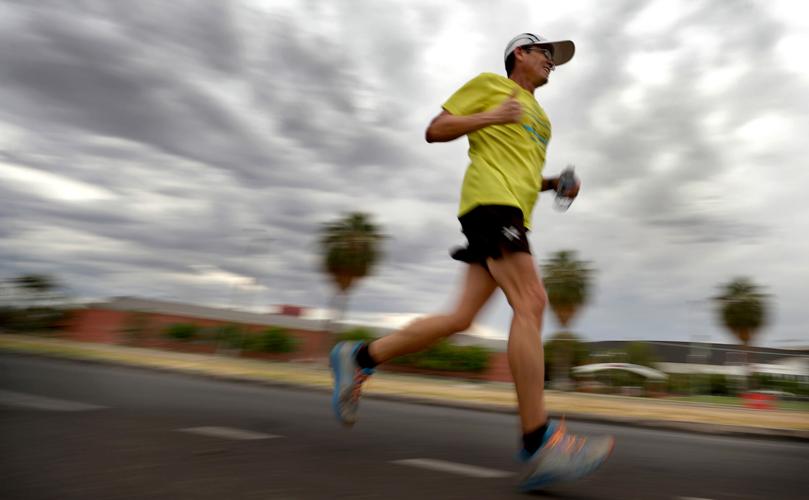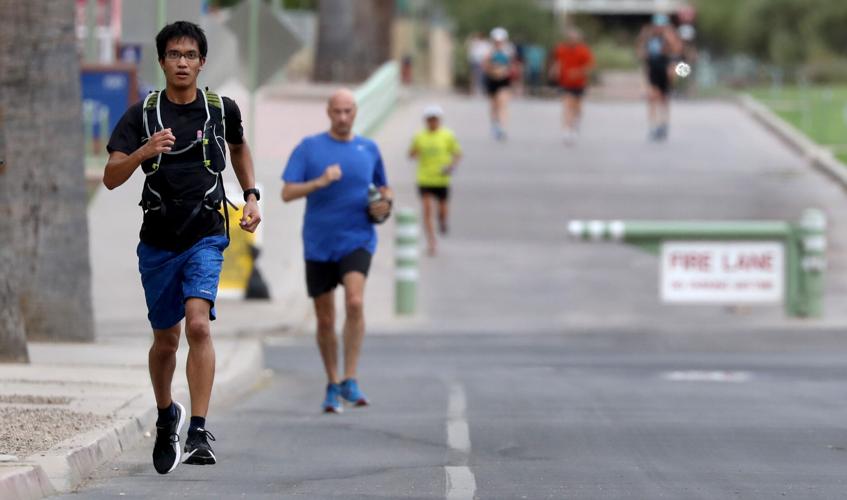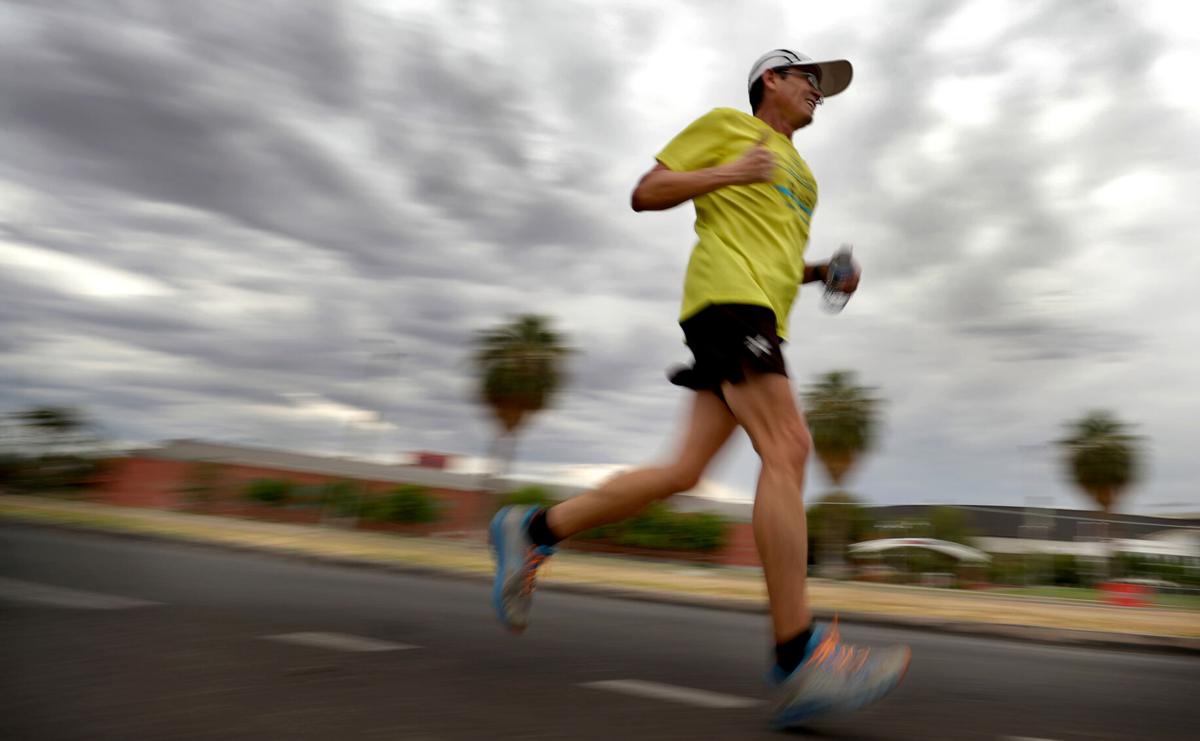With recreational sports nonexistent and gyms shuttered for much of 2020, casual athletes and fitness fanatics were left with two choices: Sit on the couch or take to the streets and trails.
Running experienced a major boost last year in Tucson and nationwide, with a recent survey of nearly 4,000 runners showing that 29% started during the pandemic.
The June survey from RunRepeat, the world’s largest running shoe review site, showed that the new-pandemic runners were motivated primarily by health. Seventy-two percent of new-pandemic runners cited physical health as their reason for taking up the sport, compared to 54% of runners who started before the pandemic. Other reasons include competition, social interaction, confidence or self-esteem and mental or emotional health.
“It’s been interesting,” said Tia Accetta, a certified running coach and fitness instructor and co-founder of Run Tucson. “I work with a lot of different types of runners at different levels. With The Workout Group, the runners we do have are very social. They love running and they love being healthy, but what gets them out the door is the social aspect.”
The Workout Group meets several times a week at various spots around town, with each workout designed with the runners’ goals and abilities in mind. The group caters to all types of runners.
However during the pandemic, Workout Group meetings were halted for a time, which had a profound effect on some of its members, Accetta said.
“It was interesting watching those runners deal with isolation with the pandemic. Some of them were in crisis mode,” Accetta said. “Everybody had to really look inward and ask, ‘What do I need for my mental health?’ And a lot of those folks found different things to get them exercising and healthy.”
Some took up mountain biking or switched from road to trail running, but that didn’t make up for the loss of social interactions or competition.
Accetta said her family bought bikes, as a way to get themselves and their kids out of the house.
“We were biking more than running. It was something we could all do together that was fun,” Accetta said. “If we hadn’t had the quarantine, we never would have been forced to try this new family activity together.”
Accetta said that if there was a silver lining, it was that people tried new things. And for many, running was one of those things.
So many people, in fact, that during the pandemic, Accetta and many longtime runners stopped visiting the Loop, as it became overcrowded at a time when they were trying to socially distance.
“When everybody decides to come out and exercise, there aren’t enough trails,” Accetta said. “But now with the heat, that always scares people away.”
Staying fit without sports
Local attorney Patrick Moran took up running during the pandemic out of necessity, when recreational soccer was no longer an option.
“I’ve never been into just jogging and running. It was always part of something else, like soccer,” said Moran, who plays in both indoor and outdoor recreational leagues. “That was my exercise, playing soccer a few times a week.”
He was able to keep up the outdoor play for a time, albeit not organized, but Moran said he just didn’t feel comfortable playing indoors. When soccer stopped, so did exercise for Moran.
Not wanting to be stuck around the house during the lockdown, Moran figured running was probably his only option, as it didn’t require any equipment or anyone’s permission.
He found a free app that claimed to be able to get him off his couch and ready for a 5K — C25K 5K Trainer — and he was off and running three times a week.
“I started at the beginning of April 2020 and I just continued with it,” Moran said. “For me, the running is not only a great way to exercise, but it really keeps me fit, from a standpoint of lean.”
Moran said that running started off as a way to stay in shape during the pandemic, but now it’s just a part of his life. It’s also helped improve his performance on the soccer field, as his cardiovascular endurance has increased.
“I like to do it in the morning and it does make you feel good afterwards, that’s for sure” Moran said. “It’s like, if I don’t do anything else today, at least I ran two miles this morning. If you start off the day with that, it helps keep everything bright for you.”

Chris Fiel, left, and Craig Haraga churn out a lap at the UA campus last week.
Branching out during lockdown
RunRepeat’s survey showed that social interaction was a driving factor for roughly 17% of pre-pandemic and 12% of new-pandemic runners, but Accetta said The Workout Group has seen plenty of new members over the past year.
One of those is Vasileios Paschalidis, who is relatively new to town and said building a community has been in the back of his mind.
“The pandemic definitely made meeting people difficult. But, running never stopped,” Paschalidis said. “So, making new friends who also love to run was a very reasonable course of action.”
In addition to joining The Workout Group, Paschalidis also joined Tucson Trail Runners, saying that he probably would have joined the groups eventually, regardless of the pandemic.
“But, I probably wouldn’t have sought them out as early as I did (if not for) the pandemic,” Paschalidis said.
Longtime runner Jessica Jones, while not new to town, echoed Paschalidis’ sentiments.
“I felt the small group runs were a great way to meet people and feel connected when everything else was shut down,” Jones said.
Jason Collins came to the group fairly new to the sport, running his first race — The Tucson Marathon — just before the pandemic.
“I always jogged for exercise, but never for sport until then. I got into running because I lost around 40 pounds, was getting too old to play the sport I’ve played for a lot of my adult life (rugby) and was looking for a way to still challenge myself.”
He joined Accetta’s group in December, after seeing them several times at Reid Park in the past while doing his own thing. And while he joined during the pandemic, that wasn’t a factor in his decision to give it a go.
“I’m a firefighter, so I work an odd schedule. However I began working out at our training facility in December and that provides a much more normal work schedule,” Collins said. “Also, working out at the academy with new fire recruits encouraged me to improve my running so that I could push them as much as possible. The regular work schedule that afforded me the time to consistently attend and the desire to push the recruits were probably the biggest motivators for joining. “
Now that marathons are back, Collins is going to attempt to improve upon his time and plans to continue to stick with the group during his training.
Embracing a new challenge
While RunRepeat’s survey showed that new-pandemic runners are nearly 20% less likely to participate in in-person races over the next 12 months, Collins and other locals are bucking that trend.
For Tucsonan Mat Friedman, running was something he actively avoided, following a season-ending injury while playing lacrosse at St. Gregory’s years ago.
Friedman was living in New York City when the pandemic hit and says his coworkers inspired him to give the sport a shot before quarantine even began. Avid runners, Friedman’s friends were regular participants in the New York Marathon and ran in half-marathons in the off-time to stay fit.
“So in late 2019, early 2020, I started running on the treadmill in my apartment gym with the goal of running a half-marathon,” Friedman said.
His training was sidelined when the pandemic hit and the apartment gym was shut down. And living with an asthmatic, Friendman did not want to run outdoors and risk exposing that person during the early stages of the pandemic.
“I stopped running until we learned more about the virus,” Friedman said.
After moving back to Tucson earlier this year, Friedman was more than ready to hit the great outdoors.
“I was cooped up in a tiny apartment all winter,” Friedman said. “But getting acclimated to the dryness and the heat was more difficult than I expected.”
But Friedman didn’t have a choice other than to stick with it: Shortly after he got back into training for the half-marathon, some relatives signed Friedman up for the Boston Marathon, scheduled for Oct. 11.
“So now I’m running four times a week with them, all outdoors” Friedman said with a laugh. “Now there’s no way out.”
‘Starting here and moving up’
While many people found ways to stay active during lockdown, others hunkered down in the pandemic and settled into a more sedentary life.
Now that vaccinations are widespread and the world is opening back up, the desire and pressure to get off the couch and back into shape has become a reality.
Accetta said that while it can be tempting to go big or return to one’s pre-pandemic level of activity, that’s a mistake.
“Start off small. It’s really hard, because everyone wants to go back at the same level they were at when they quit,” Accetta said. “But it’s really important for longevity and consistency to start small, so that you can go back the next day.”
Accetta said to not think of it as starting from scratch, but rather “starting here and moving up.”
“If it’s running, start at the point where you can finish feeling like you can do more,” Accetta said. “Save some gas, save yourself and you’ll be able to come back the next day. You always want to feel better and not worse when you start exercising.”
It’s also important to consider outside factors, like the weather, if running outdoors.
“Get out early, otherwise you’re going to hate life,” Accetta said.
And for those who don’t love running, all isn’t lost. There are plenty of other options.
“Don’t be afraid to cross-train. The goal of fitness is to be consistent, so if you can find a couple different ways to get out and exercise each day, that’s better than running and taking a bunch of days off,” Accetta said.
Creating little wins
Local nutrition consultant Zoë Schroeder also stressed the importance of starting small, saying that it’s important to create sustainable change and build new habits.
“You have to start out small, not only because your body isn’t used to it ... but also in terms of actually continuing the habit,” Schroeder said. “If someone is going from nothing, start out two days a week. Start walking, then maybe bump up to three days. But often times, once people start moving, it’s almost addicting.”
Schroeder said she likes to talk to clients about habit stacking, and tackling one change at a time before taking on another.
“One it becomes something you won’t do, that can lead to a lasting change,” Schroeder said.
A registered dietitian, certified personal trainer and certified strength and conditioning expert, Schroeder started an online nutrition business in January, and has been working to help her clients improve their lifestyles.
Schroeder said that because exercise and nutrition go hand-in-hand when talking about lasting changes, a big piece of the equation is planning.
“It’s not glamorous, but it’s important,” Schroeder said. “Make a plan for meals — it doesn’t have to be the whole week — and make a grocery list.”
Schroeder said picking out key base ingredients that can be used in other recipes, and batch cooking items like ground turkey, chicken and rice can be key in combatting the urge to order takeout.
Schroeder’s business — Zoë Schroeder Nutrition — focuses on using sustainable behavior changes to help people reach and maintain their body and health goals. Her four-phase approach includes awareness, results, recovery and independence.
“It’s not just another quick fix, but more of a lifestyle transformation,” Schroeder said. “It’s really not what people are used to.”
Schroder tailors clients’ plans to what they want and need, but there are a few general rules that apply to everyone.
Hydration is key, and Schroeder recommends hydrating early and often. She also stresses the importance of not skipping breakfast.
“Starting the day off with breakfast, you just feel good,” Schroeder said. “You’re more likely to make better choices throughout rest of day because you’re starting the day off with a win.”
In terms of fueling up pre-run or for a training session, Schroeder said a carb-centric snack 30 minutes to an hour before is a good way to support recovery and muscle synthesis.
“You want to create little wins throughout your day,” Schroeder said. “Success is the biggest motivator.”






